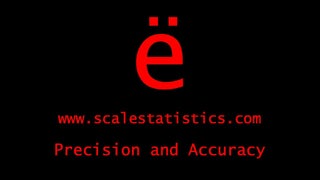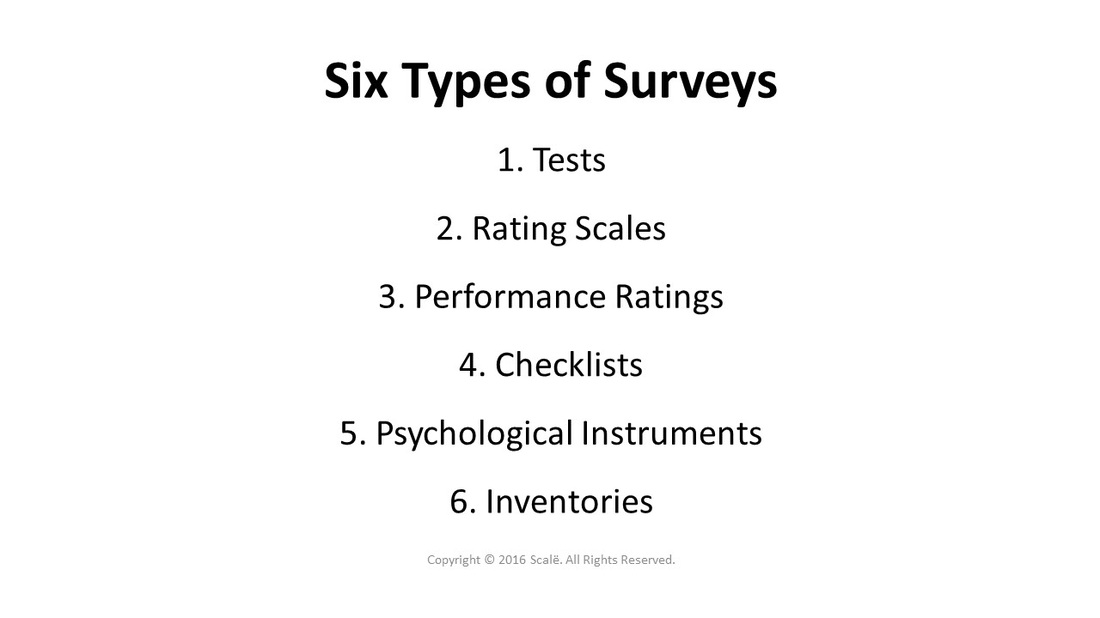Survey types
There are six types of surveys available for different research questions
1. Tests are used to measure the level of mastery or achievement in a given content area. A test is a series of questions or items that measure some sort of educational or psychological attribute. Members of the population of interest are given a series of questions and are expected to give correct responses or perform at a certain level that is representative of mastery. Item Response Theory (IRT) is the more appropriate choice of empirical design when creating tests.
2. Rating scales evaluate how members of a given population make subjective judgments related to a phenomenon or construct of interest. This type of data is often collected by having participants give a numerical rating along a continuum, such as in a Likert scale.
3. Performance rating instruments allow for external and independent observers rate a participant's ability to successfully complete relative tasks.
4. Checklists establish the prevalence of attributes, feelings, thoughts, perceptions, behaviors, or other constructs in a population of interest.
5. Psychological instruments are utilized in an objective and standardized fashion to assess cognitive, affective, emotional, vocational, intelligence, and personality characteristics. These instruments have gone through rigorous psychometric testing to establish a measure that is both precise and accurate in its interpretability in the current clinical context.
6. Inventories are employed to assess individual human interests, characteristics, feelings, thoughts, behaviors, or other constructs.
2. Rating scales evaluate how members of a given population make subjective judgments related to a phenomenon or construct of interest. This type of data is often collected by having participants give a numerical rating along a continuum, such as in a Likert scale.
3. Performance rating instruments allow for external and independent observers rate a participant's ability to successfully complete relative tasks.
4. Checklists establish the prevalence of attributes, feelings, thoughts, perceptions, behaviors, or other constructs in a population of interest.
5. Psychological instruments are utilized in an objective and standardized fashion to assess cognitive, affective, emotional, vocational, intelligence, and personality characteristics. These instruments have gone through rigorous psychometric testing to establish a measure that is both precise and accurate in its interpretability in the current clinical context.
6. Inventories are employed to assess individual human interests, characteristics, feelings, thoughts, behaviors, or other constructs.
The survey methods described in the Surveys engine are more appropriate for rating scales, checklists, and inventories. These types of surveys are more general in their scope versus the other choices. Tests require employment of Item Response Theory (IRT) to properly assess the ability of individual test items to measure for mastery. Psychological instruments takes years of rigorous validation in large and diverse samples of the population. Performance assessments can be widely varied.
Click on the Survey Parts button to continue.
Hire A Statistician
DO YOU NEED TO HIRE A STATISTICIAN?
Eric Heidel, Ph.D., PStat will provide you with statistical consultation services for your research project at $100/hour. Secure checkout is available with Stripe, Venmo, Zelle, or PayPal.
- Statistical Analysis on any kind of project
- Dissertation and Thesis Projects
- DNP Capstone Projects
- Clinical Trials
- Analysis of Survey Data

